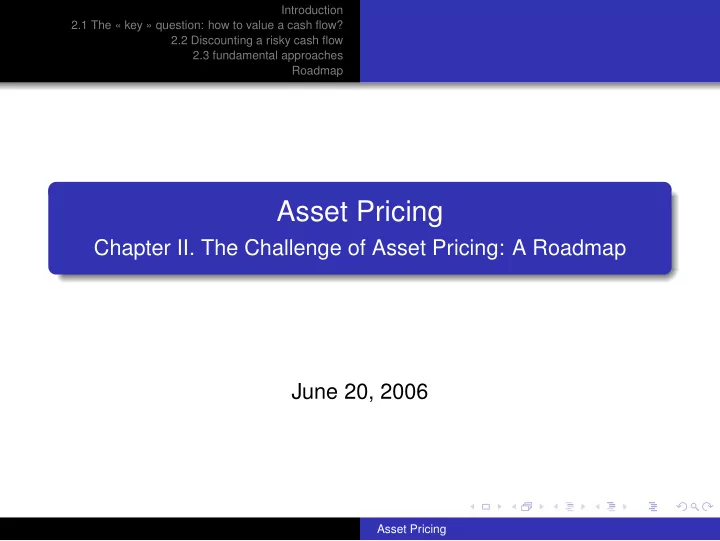

Introduction 2.1 The « key » question: how to value a cash flow? 2.2 Discounting a risky cash flow 2.3 fundamental approaches Roadmap Asset Pricing Chapter II. The Challenge of Asset Pricing: A Roadmap June 20, 2006 Asset Pricing
Introduction 2.1 The « key » question: how to value a cash flow? 2.2 Discounting a risky cash flow 2.3 fundamental approaches Roadmap A Roadmap « The ideas of economists and political philosophers .. are more powerful than commonly understood. Indeed the world is ruled by little else. Madmen in authority, who hear voices in the air, are distilling their frenzy from some academic scribbler of a few years back. » J.M. Keynes Asset Pricing
Introduction 2.1 The « key » question: how to value a cash flow? 2.2 Discounting a risky cash flow 2.3 fundamental approaches Roadmap Table 2.1 : Valuing a Risk-Free Cash Flow t = 0 t = 1 t = 2 t = T − 3 mio 1 mio 2 mio 3 mio 1 mio 1 mio 1 mio ( 1 + r f ( 1 + r f 2 ) 2 ( 1 + r f 3 ) 3 1 ) $1 dollar today � = $1 dollar tomorrow Asset Pricing
Introduction 2.1 The « key » question: how to value a cash flow? 2.2 Discounting a risky cash flow 2.3 fundamental approaches Roadmap 1 E ˜ E ˜ E ˜ 3 + π ) 3 ; or E ˜ CF 1 CF 2 CF 3 CF τ − Π τ 1 + π ); 2 + π ) 2 ; . ( 1 + r f ( 1 + r f ( 1 + r f ( 1 + r f τ ) τ 2 E ˜ ˆ CF τ τ ) τ ; ( 1 + r f 3 � q ( θ τ ) CF ( θ τ ) , θ τ ∈ Θ τ Asset Pricing
Introduction 2.1 The « key » question: how to value a cash flow? 2.2 Discounting a risky cash flow 2.3 fundamental approaches Roadmap 2 fundamental approaches Equilibrium approach: from first principles starting with hypotheses on the structure of the economy and the behavior of economic agents. By arbitrage: « piggybacking » on existing price observations Asset Pricing
Introduction 2.1 The « key » question: how to value a cash flow? 2.2 Discounting a risky cash flow 2.3 fundamental approaches Roadmap Equilibrium price of a bicycle Analysis of supply and demand for bicycles and substitute products Needed: A theory of demand for investments Starts with postulates on behavior and derivation of their consequences Asset Pricing
Introduction 2.1 The « key » question: how to value a cash flow? 2.2 Discounting a risky cash flow 2.3 fundamental approaches Roadmap Arbitage pricing of bicycles 2 wheels: p w x 2 1 saddle: p s x 1 1 frame: p f x 1 Bicycle: 1 gearshift: p g x 1 2 brakes: p b x 2 p bicycle (free labor) Asset Pricing
Introduction 2.1 The « key » question: how to value a cash flow? 2.2 Discounting a risky cash flow 2.3 fundamental approaches Roadmap THE ROADMAP Equilibrium Arbitrage Utility theory - Ch.3-4 Preliminaries Investment de- mand - Ch.5-6 Computing risk CAPM - Ch.7 APT - Ch. 13 premia CCAPM - Ch.9 Martingale measure - Identifying distorted Ch. 11 & 12 probabilities Pricing future dollars A-D pricing II - A-D pricing I - Ch. 8 state by state Ch. 10 New Chapter on Asset management: Ch.14 Incomplete markets and Modigliani-Miller: Ch.15 Heterogeneous Information and the Efficient Market Asset Pricing
Recommend
More recommend